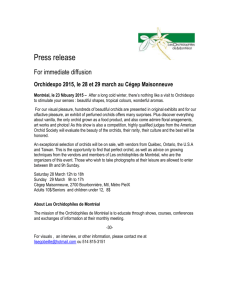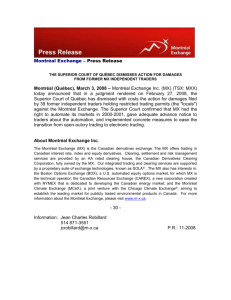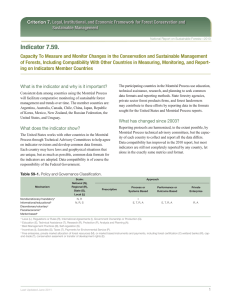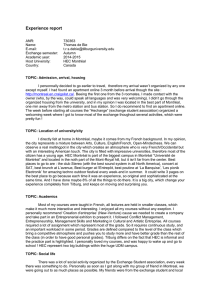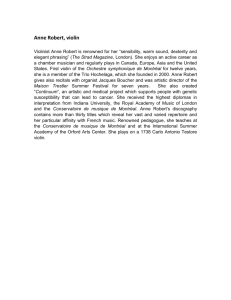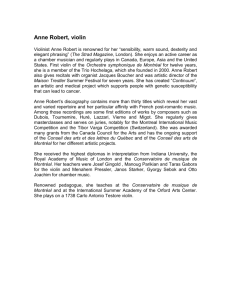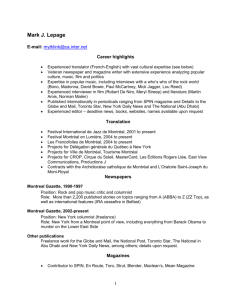Document 12097454
advertisement
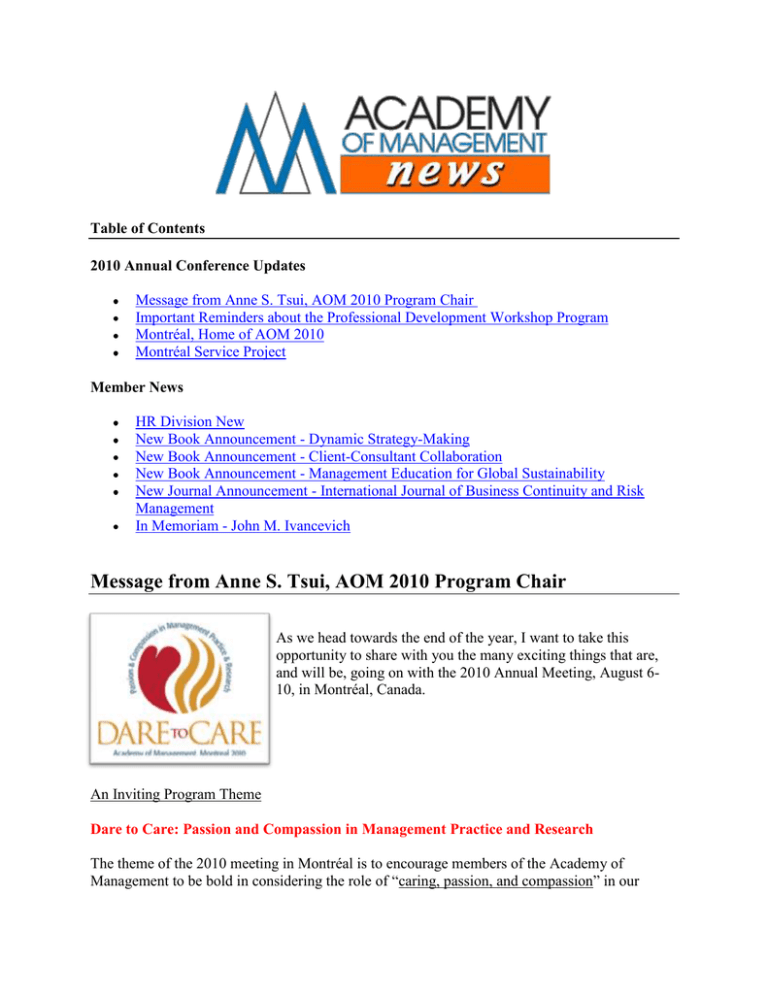
Table of Contents 2010 Annual Conference Updates Message from Anne S. Tsui, AOM 2010 Program Chair Important Reminders about the Professional Development Workshop Program Montréal, Home of AOM 2010 Montréal Service Project Member News HR Division New New Book Announcement - Dynamic Strategy-Making New Book Announcement - Client-Consultant Collaboration New Book Announcement - Management Education for Global Sustainability New Journal Announcement - International Journal of Business Continuity and Risk Management In Memoriam - John M. Ivancevich Message from Anne S. Tsui, AOM 2010 Program Chair As we head towards the end of the year, I want to take this opportunity to share with you the many exciting things that are, and will be, going on with the 2010 Annual Meeting, August 610, in Montréal, Canada. An Inviting Program Theme Dare to Care: Passion and Compassion in Management Practice and Research The theme of the 2010 meeting in Montréal is to encourage members of the Academy of Management to be bold in considering the role of ―caring, passion, and compassion‖ in our activities of teaching, research, service, and practice. The theme encourages us to consider the implications for research and practice if the manager’s role is to enhance the wellbeing of, and generate value for, all the stakeholders (including shareholders, customers, employees, investors, and the public) and not only for themselves. The theme challenges us to consider organizational forms and processes if and when managers truly integrate passion for their work with compassion for others impacted by their work. The theme invites us to explore new teaching content and pedagogy if we seek to motivate our students to think about contribution or value creation rather than salary as the only measure of career success. The theme pushes us to examine how our scholarly pursuit would be different if passion and compassion define our scholarly endeavors. The theme dares us to challenge the status quo and to explore new paradigms that take humanity into the forefront in our economic decisions and activities. Submissions to the 2010 Program The Call for Submissions was published in October, and ALL submissions must be made via the Academy's submission system, which officially opened on November 3. Please carefully review the submission guidelines and procedures prior to submitting. Submissions that do not follow the guidelines or are incomplete will not be reviewed. The submission deadline for papers, symposia, and PDW proposals is January 14, 2010 at 5:00 PM ET (New York Time). The deadline for Caucus proposals is March 9, 2010. Contribute by Serving as Reviewers The annual meeting program is not possible without the excellent work and great effort from dedicated and committed reviewers. I encourage you to sign up as a volunteer reviewer for the 2010 program. You can sign up to review for up to three divisions and/or interest groups. You may be asked to review up to three submissions (papers and symposia) per division or interest group that is selected. The review period for the 2010 Annual Meeting is from January 14, 2010 (Submission Deadline) to February 12, 2010 (Review Deadline). Please sign up now on the reviewer sign up website. Helping to review is a sign of ―caring.‖ Thank you! Refinements in the 2010 Scholarly Program Based on feedback from participants, and in the spirit of continuous improvement, we have introduced several refinements in the Scholarly Program on Monday and Tuesday. There will be NO more Visual Village and the Interactive paper sessions. In their place, we have introduced three new formats, the Divisional Roundtable Paper Sessions, the Cross-divisional Paper Sessions, and the Discussion Paper Sessions. Now, there are a total of six different types of sessions in the Scholarly Program. Each is described briefly below. This variety will ensure that authors and other meeting participants will derive the most benefits and enjoyment from their involvement in the scholarly program. (1) Divisional Presentation Paper sessions will consist of papers with a common theme. Each author will have a set amount of time to present their work, and group discussions will follow after all presentations have been made. The Division Program Chairs will organize these sessions. (2) Divisional Roundtable Paper sessions will consist of papers with a common theme that will draw a more focused audience. Authors will present their work, and then engage in a more intimate discussion with attendees. The Division Program Chairs will organize these sessions, based on the topical nature of the accepted papers. (3) Cross-Divisional Paper sessions will consist of papers on topics that span the domains of multiple divisions. These sessions will give attendees the opportunity to discuss the papers from multiple perspectives. A Cross-Divisional Papers Committee, chaired by Peggy Lee of the Arizona State University and the University of Texas, Austin (Peggy.Lee@mccombs.utexas.edu) will organize these sessions, with papers identified by the Division Program Chairs based on the topical nature of the accepted papers. (4) Discussion Paper sessions will consist of papers that, with refinement, have the potential to break new ground or make important contributions. Authors will discuss and explore areas for further development with a discussant and others who share similar research interests. The Discussion Paper Session Committee, chaired by Tom Becker of the University of Delaware (becker@lerner.udel.edu) will structure the Discussion Paper Sessions with papers identified by the Division Program Chairs selected from among the accepted papers. (5) Divisional and Co-sponsored Symposium sessions will consist of presentation and panel symposia that focus on specific topics. Presentation symposia will have multiple papers around a common theme. Panel symposia will involve panel discussions without specific papers. Each symposium can be submitted to up to three divisions. (6) Caucus sessions are designed to provide a convenient, informal way for Academy members with shared interests to discuss common issues, and to explore potential research collaborations. It also can be used to discuss work in progress, or to share insights on a unique phenomenon, a published paper or a book. We have expanded the domain of caucuses with the aim to provide conference participants with opportunities to network with colleagues who share similar interests. The Caucus Committee, chaired by Hui Liao of the University of Maryland (hliao@rhsmith.umd.edu), will organize the Caucus sessions. Even though there are six types of sessions in the Scholarly Program, authors submit individual papers to only one division, symposium proposals to up to three divisions, and caucus proposals without divisional designation. Sunday, August 8, All-Academy Theme Day We are planning an exciting program on Sunday to feature PDW and symposia related to the AllAcademy theme: Dare to Care: Passion and Compassion in Management Practice and Research. Joshua Margolis of the Harvard Business School is the chair. If you have an idea for an AAT submission and would like to discuss it with Joshua, please do so by December 15 so that you will have time to revise your proposal as needed before submitting. The deadline for AAT submissions is January 14, 2010 at 5:00 PM ET (New York Time). Special Local Arrangements Committee Activities in Montréal The Montréal Local Arrangements Committee is planning many exciting opportunities for us to enjoy the city and all it can offer. Please read the articles on ―what to do in Montréal‖ about places to go and things to see. Please read the articles on ―service projects in Montréal‖ about opportunities to do some volunteering activities that are both enjoyable and rewarding. The Academy meeting is more than just sitting in the rooms and talking about idea. It is also about meeting old friends and making new ones, about new experiences in the host city and about being and caring. Make Montréal a special meeting for you by participating in some extracurriculum activities, organized by our Local Arrangements Committee as well as your divisions. The 2010 Annual Meeting is shaping up to be another exciting conference. Thanks to everyone for participating as authors, reviewers, volunteers, or in any other capacity that suits your interest and expertise. I look forward to working with all of you on a great program in Montréal! Anne S. Tsui Vice President and Program Chair Arizona State University and Peking University Xian Jiao Tong University and Fudan University Important Reminders about the Professional Development Workshop Program Message from Ming-Jer Chen, AOM Professional Development Workshop Chair As we near the end of the year, and with the submission deadline immediately following the advent of the New Year, I want to take this opportunity to remind you of some of the important changes that have recently been made to the PDW program. Now is also a good time to start putting the finishing touches on your PDW proposals. It is important to check that your proposals have followed all of the submission guidelines, and to keep in mind the Rule of Three + Three when submitting proposals of your own, as well as when accepting invitations to participate in other workshops. Important reminders: • A PDW program spans two full days, 8 a.m. to 8 p.m., on Friday and Saturday during the Annual Meeting. • A PDW can be any length of time (in two-hour blocks), ranging from 2 hours to 12 hours (or more). • Each PDW proposal can be submitted to only one division, interest group, or committee. • Sunday during the Annual Meeting is devoted to the All-Academy Theme PDWs. Joshua Margolis is the chair. • All submissions must be done through the AOM’s submission website. The deadline is January 14, 5:00 p.m. ET (New York Time). I encourage you to visit the 2010 Annual Meeting website for detailed information on PDW policies and rules, submission guidelines and processes. The PDW resources page has suggestions and ideas for creating and managing a good professional development workshop as well as samples of past PDW proposals that have resulted in successful experiences for participants. Also, please view ―A Guide to Good PDWs‖ for valuable insight into developing interactive and developmental PDWs. Remember to be creative, ―think outside the box,‖ and experiment with new ideas. If you would like to receive feedback on your proposal, please contact the appropriate PDW Chair(s) by December 15th so that you will still have time to revise your proposal as needed before submitting it. Thank you in advance to everyone who submits. I look forward to working with all of you on another successful PDW program with many innovative workshops and outstanding learning experiences for our members. Ming-Jer Chen University of Virginia 2010 Academy of Management Meeting Chair, Professional Development Workshops Montréal, Home of AoM 2010 Montréal is one of the oldest cities in North America and is located in the south of the beautiful province of Québec, in Canada. It is situated on an island and it is home to 1.8 million inhabitants. A gateway to the Americas, Montréal is a fascinating city. Its typically North American vitality is the perfect match for its European-inspired way of life. Truly an international city, it is multilingual, pluralistic, cosmopolitan, and diverse. All communities come together and contribute to the city’s rich, sophisticated heritage and vivacious atmosphere. This is why Montréal is one of Canada’s most enduring and enjoyable living experiences. While French is the predominant language, there is also a large English-speaking population. Health care, television, radio, museums, entertainment, shopping, and most public services are readily available in English and - in many cases - a variety of other languages as well. Montréal is not only a bilingual city where English and French live side by side and intermingle quite naturally: Montréal is also home to some 35 languages and at least as many well-established cultural communities, including the Italian, Chinese, Greek and Spanish-speaking communities. Montréal is a beautiful city that melds old world architecture with modern innovation. A quick tour along the streets reveals the contrast from the charming 19th century buildings in Old Montréal to the modern look of Place Ville-Marie. The city streets are mirrored below by ―the underground city‖. Underground passages link several buildings in the downtown core including office buildings, shopping centres, cinemas, galleries, hotels, restaurants, and cultural institutions with an effective public transit system that includes an easy-to-use and safe underground metro system. Montréal overflows with warmth year-round, thanks to a whirlwind of cultural and sporting activities that fill its busy calendar, including year-round ice-skating! There is a 1000-acre mountain in the heart of the city, Mont Royal, with parks, jogging and bike paths, as well as Beaver Lake; an ideal family outing easily accessible and a short walk from downtown. There are over 35 museums you can visit, as well as the Olympic Stadium, Botanical Gardens, Biodôme and the Old Port. Montréal is also known for its cuisine: Bistros, pubs and restaurants serve food from all over the planet, enough to satisfy every palate, appetite and budget, not to mention the home-grown specialities that have gained increasing renown. Montréal is a city that doesn’t sleep, with bars and entertainment in full swing while the sun rises. Pre and post conference there are also not to be missed excursions to historic Quebec City, Canada’s capital Ottawa, Mont Tremblant in the Laurentians, the charming villages of the Eastern Townships and much more! So make sure you have a valid passport and don’t forget to check if you need a visa because we are sure you’ll never forget your visit to beautiful Montréal!!! Montréal Service Project In the spirit of the "Dare to Care" conference theme, this year's Service Project will be an exciting partnership with the Montréal YWCA. Celebrating their 135th anniversary in 2010, the Montréal YWCA has strong ties across the city's business and social community. Boasting more than 450 volunteers and serving hundreds of families in need, the Montréal YWCA programs include literacy, employability, leadership, entrepreneurship, integration services, tax & legal clinics and housing. To encourage as much participation as possible, this year's service project will offer a variety of activities in which you can participate. You can participate in the Entrepreneurship Workshop by offering your ideas to small business owners. You can donate your used business clothing or your old textbooks and journals. You can buy a t-shirt or help us build the "Dare to Care with the YWCA" wall. You can listen to the Canadian YWCA President speak or learn all about the Montréal YWCA at Service Project Central. You can donate your lose Canadian change before you go. If you want, you can even do it all! Dare to Care, in Montréal, with the Montréal YWCA! HR Division News Greetings! As Chair of the HR Division, I’d like to tell you about some of our new initiatives. Not a member of the HR Division? Maybe you should be. The biggest issues facing organizations today are human and social capital issues … and that is HR! Greetings! As Chair of the HR Division, I’d like to tell you about some of our new initiatives. Not a member of the HR Division? Maybe you should be. The biggest issues facing organizations today are human and social capital issues … and that is HR! If you think the HR Division is only for those interested in traditional, transactional HR activities, think again. We are still the place for those topics, but the HR Division’s domain is much broader, encompassing all aspects and perspectives on the employment relationship at the individual, group, organizational, societal, and cross-cultural levels. If you are happy with your current Divisions or Interest groups, you can add an additional division for just $9 more a year. The easiest time to do so is when you renew your Academy membership but it can be done anytime by emailing your request to membership@aom.pace.edu. My goal for the HR Division is that it be viewed as a relevant and valuable resource for the professional needs of all of its members. Towards this end, the HR Division has initiatives underway aimed and better understanding and meeting member needs regardless of geography, institution size or focus, career stage, or topical interests. As some examples, a Practice Liaison Committee is exploring ways to connect practitioners and researchers so that HR Division members can help organizations solve their problems while gaining access for research. Our Teaching Committee is working on creating a vibrant community of practice around the teaching of HR and is exploring the possibility of a teaching conference. The International Committee is identifying international conferences with which we can partner and our Ambassadors’ program, representing members in 50 countries, continues to grow and help us better understand and meet the needs of our global members. Our Membership and Communications Committee is looking into how we can better use new media to help members interact and the Division review that is underway will allow us to identify additional ways to better serve our member’s needs. Check out the HR Division’s website (www.hrdiv.org) for more on all these initiatives and others. The HR Division’s program at the 2009 AOM meetings in Chicago was filled with great sessions, workshops, and recognitions of achievement, and networking events. The 2010 conference in Montreal is shaping up to be even better. The range of professional development workshops and consortia offered by the HR Division is another example of how we meet member needs regardless of interest, geography, focus, or career stage. Please submit your ideas for Professional Development Workshops and your Scholarly work to the HR Division. So if you are a member of the HR Division, I encourage you to become more involved and, if you are not a member, I encourage you to think about joining. In either case, if you have any questions, comments or suggestions, please let me know (klein_12@fisher.osu.edu). – Howard J. Klein, HR Division Chair, The Ohio State University New Book Announcement - Dynamic Strategy-Making Dynamic Strategy-Making: A Real-Time Approach for the 21st Century Leader By Larry Greiner and Thomas Cummings Jossey-Bass, 2009 Most scholarly treatments of strategy avoid the question of concrete ways to make strategy happen. Based on the authors’ 20year journey through the minefields of strategy research and consulting—with clients ranging from aerospace, construction, software, hotels, HMOs, to a 18,000 academic association... —Greiner and Cummings believe that organizations need to address simultaneously both strategic content and strategic process, the ―what‖ and ―how‖ of strategy making. This enables organizations to create the right strategy and to get it implemented. Dynamic Strategy-Making shows how strategy making can be made real-time to respond to a dynamic world. It describes how organizations can create a ―strategic system‖ to address strategic content and process continuously and to make necessary revisions when things change. The strategic system enables organizations to assess their environment and capabilities/resources and to create a statement of strategic direction that fits them together. The system also provides a participative process for creating strategy and strategic leadership and change for making it happen. Dynamic Strategy-Making presents several case studies of strategy making in action. It describes both successes and failures, and draws specific lessons from them as well as the existing strategy literature. The book provides concrete guides for creating, implementing, and revising real-time strategy. It shows what it takes to translate strategic intent into effective action throughout the organization. New Book Announcement - Client-Consultant Collaboration CLIENT-CONSULTANT COLLABORATION: COPING WITH COMPLEXITY AND CHANGE. Edited by Anthony F. Buono, Bentley University, and Flemming Poulfelt, Copenhagen Business School. Publisher: Information Age Publishing, 2009. The tenth volume in the Research in Management Consulting series, ClientConsultant Collaboration: Coping with Complexity and Change, draws on papers presented at Management Consulting Division’s International Conference on this theme in Copenhagen, Denmark in June 2007. The volume presents twelve chapters that explore a broad range of questions and concerns that illustrate the scope and complexity of the consultant–client relationship. The chapters illustrate the richness and excitement that takes place not only in research on consulting but also in its application as the various empirical analyses of consulting in practice portray. CONTENTS: Introduction. Anthony F. Buono, Bentley University and Flemming Poulfelt, Copenhagen Business School. PART I: THE CLIENT-CONSULTANT RELATIONSHIP. Clients’ Different Moves in Managing the ClientConsultant Relationship, Mirela Schwarz, University of Southampton and Timothy Clark, University of Durham. Inside the Client-Consultant Relationship: Consulting as Complex Processes of Relating, Stephen Billing, Exponential Consulting LTD. Systemic Concepts of Intervention, Michael Mohe, University of Oldenburg and David Seidl, University of Zurich. PART II: CHANGE CAPACITY IN CONSULTING. Enhancing Change Capacity: Client-Consultant Collaboration in Creating a Foundation for Emergent Change, Kenneth W. Kerber, Kerber and Associates & Anthony F. Buono, Bentley University. The Experience of being Changed through Consulting, Catherine PalmerWoodward, University of Hertfordshire/Arturo Consulting and Don MacLean, University of Glasgow Business School. Creating World Class OD through Collaboration: Blending the Roles of Internal Corporate Consulting and the University, Therese Yaeger, Benedictine University, Philip Anderson, JohnsonDiversity Inc., Peter Sorensen, Benedictine University and Ghazala Ovaice, Abbott. PART III: INCREASING THE EFFECTIVENESS OF CLIENTCONSULTANT COOPERATION. Sharing Across Boundaries: The Dual Role of Being Both a Consultant and a Client, Susan L. Sweem, Benedictine University. Challenge as an Outsider - Know as an Insider: Client Experiences of Collaboration with Consultants, Irene Skovgaard Smith, Copenhagen Business School. The Need for Management Advisory Services: A Consequence of Institutionalization, Organization, and Trust, Staffan Furusten, Stockholm School of Economics and Andreas Werr, Stockholm School of Economics. PART IV: TRUST AND POWER IN CONSULTING. Mapping the Client’s Political Terrain: A Model of Analysis for Consultants, Alberto Zanzi, Suffolk University and Susan M. Adams, Bentley University. Power Bases and Power Use in Consultancy, Ben Emans, University of Groningen, Astrid Boogers – van Griethuijsen, University of Groningen, and Janka Stoker,University of Groningen. You Can’t Improvise on Nothin‖: Attaining Trust in the Client-Consultant Relationship, Lovisa Näslund, Stockholm School of Economics. About the Authors. Link: http://www.infoagepub.com/products/Client-Consultant-Collaboration New Book Announcement - Management Education for Global Sustainability Charles Wankel and James A.F. Stoner, Management Education for Global Sustainability. Information Age Publishing, 2009. Charles Wankel and James A.F. Stoner, Management Education for Global Sustainability. Information Age Publishing, 2009. New Journal Announcement - International Journal of Business Continuity and Risk Management Inderscience Publishers (http://www.inderscience.com) is pleased to announce the publication of the first issue of International Journal of Business Continuity and Risk Management (http://www.inderscience.com/ijbcrm). Edited by Prof. Kurt J. Engemann, Iona College, USA, it provides a professional and scholarly forum in the essential field of business continuity and risk management. Organisational resiliency through risk assessment, contingency planning, systems security, crisis and disaster management, and recovery planning, as well as public policy regarding infrastructure and security, are integrated in the journal’s coverage. There is a free download of the papers from this first issue at http://www.inderscience.com/sample.php?id=333 In Memoriam - John M. Ivancevich In Memoriam John M. Ivancevich (1939-2009) The management discipline lost a creative thinker, an awardwinning educator, an outstanding scholar, and a person of unrelenting energy and high integrity when John (Jack) M. Ivancevich passed away on October 26, 2009, at the age of 70 in Houston, Texas. A product of Chicago’s south side, Jack’s love of family and exceptional work ethic were shaped by the ethnic milieu that anchored his entire life. The author or co-author of 88 books and some 160 scientific articles, Jack had a passion for business education. Noted for his self-discipline, Jack always kept a notebook of projects at hand and tried to write at least 300 days a year, averaging 1200 words each day. He was proudest of his first textbook Organizations: Behavior, Structure, Processes, published in 1973 and now in its thirteenth edition. Jack held a B.S. degree in Industrial Management from Purdue University, an MBA in Organizational Behavior and a DBA in Administrative Behavior and Organizational Analysis, both from the University of Maryland. After teaching at the University of Kentucky (1968-74), Jack joined the University of Houston faculty in 1974. He was named Chair of the UH Department of Organizational Behavior and Management in 1975, and Associate Dean for Research in 1976. Jack was awarded the Hugh Roy and Lillie Cranz Cullen Professor of Management, among the most prestigious positions at the University of Houston, in 1979. From 1988 to 1995, he served as Dean of the UH College of Business Administration. He was named UH Executive Vice President for Academic Affairs and Provost in 1995, a position he held for two years. While serving as dean, Jack continued to write and insisted on teaching at least one undergraduate course every year. He felt he learned more about what was happening in the UH College of Business Administration by teaching juniors and seniors than any by other method. Irked by administrators who bragged about not setting foot in the classroom for years and how their busy schedules kept them from publishing, as provost Jack required that all UH deans teach one course a year and held fast to the belief that every administrator should add to the body of knowledge in their respective disciplines by publishing. Needless to say, this did not make him popular with certain deans on campus. As a member of 80 doctoral and master’s committees, Jack relished his role as a mentor to students, as well as younger colleagues. He was perhaps most comfortable in the classroom, where his reputation as a tough teacher was softened by his appreciation for the need of many students to balance a desire for education with a full-time job and family demands. Among Jack’s most valued honors were the Ester Farfel Award for Research, Teaching, and Service Excellence, the highest honor bestowed to a UH faculty member, and being named a Fellow of the Academy of Management in 1977. A self-described ―hard-core Type A,‖ Jack could at times be impatient and was especially intolerant of broken promises made by faculty and administrators to complete a project. A ―can do‖ person, Jack had an infectious enthusiasm, zest for life, and upbeat spirit that was sadly shortened by a long battle with cancer. He dealt with his illness the same way he approached living – taking it head on, fully aware of his own mortality, while fully enjoying his wife and children, and spoiling his grandchildren. He fought until the end and will be sorely missed by all those fortunate to have been touched by his warm friendship. Jack is survived by his wife of 37 years, Margaret (Pegi) Karsner Ivancevich; son Daniel and wife Susan; daughter Jill and husband David Zacha, Jr.; and grandchildren Kathryn Diane and Amanda Dana Ivancevich, and Hunter David Michael, Hailey Dana, and Hannah Marie Zacha. Jack was preceded in death by his beloved daughter Dana, and by his first wife, Diane Frances Murphy Ivancevich. Memorials may be directed to the Dana Louise Ivancevich Memorial Scholarship Fund – Texas Christian University; Attn: Victor J. Boschini, Jr, Chancellor; TCU Box 297080, Fort Worth, Texas 76129-7080 or NSDAR – Dana’s Children Fund at Hindman Settlement School, Kentucky; Attn: Carolina Camargo, Development Director; 1776 D Street N. W., Washington, DC 2006-5303. Arthur G. Bedeian Louisiana State University
